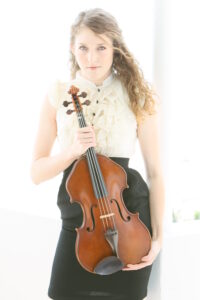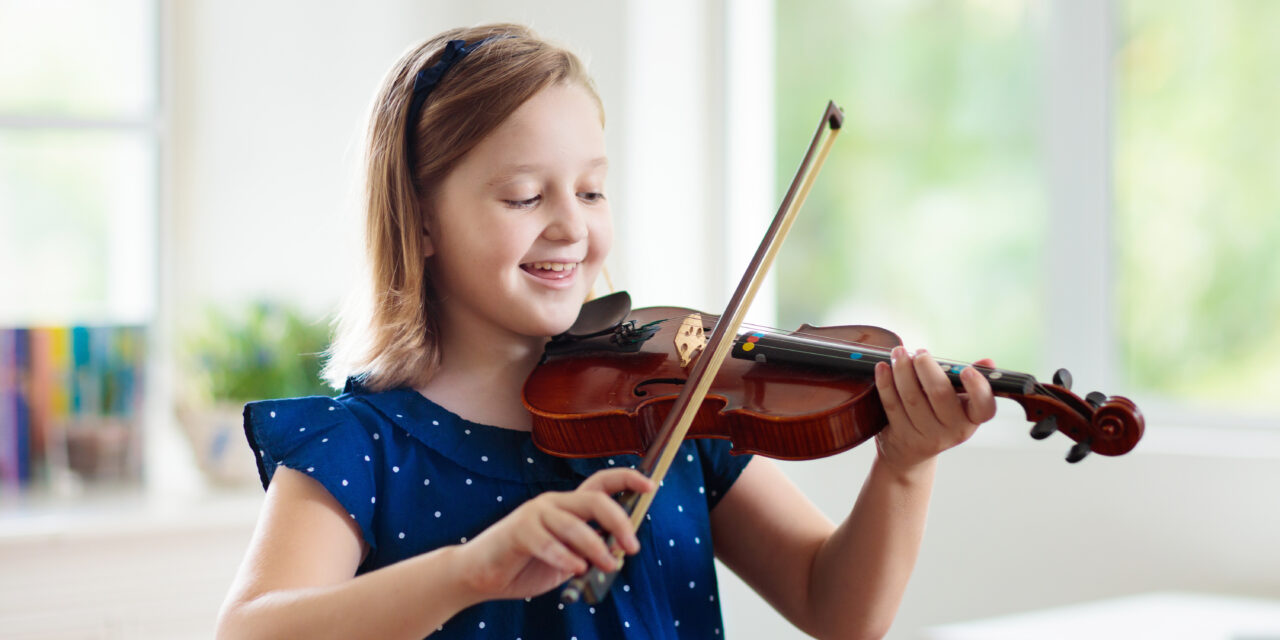Your child wants to learn a musical instrument. Now, what?
Are they too young? Too old? Where do I find a teacher? How much will it cost? These are many of the questions burning through our brains when we find out our children are musical and want to explore lessons.
My parents faced this reality when I was a child, and eventually started me violin lessons at the ripe age of 3. They didn’t just start me in any lessons. They did their research and chose the Suzuki method, and so I became a Suzuki student, and I often credit 90% of my musicality to it. The program, and my teacher, Eve Hubbard, developed my ear and my understanding of music at a young age, and I truly believe it provided the foundation I needed to attend a music conservatory for college. Now, both of my children are taking Suzuki lessons, and my 7-year-old daughter has even gone on to compete in a State competition, feeling hardly any pressure and a lot of pride and joy for her accomplishments. I have watched as both of my children have developed a love for creating and making music. As a parent, I know that it is working!
Su-zu- WHAT?? You might have heard of the Suzuki method, but may not know exactly what it is. Allow me to break it down for you. I asked Suzuki educator, Laura Sinclair, to answer some important questions about the Suzuki method, so you can decide if it is right for you!
What is the Suzuki method?
The Suzuki Method is a method of music instruction was developed by Dr. Shinichi Suzuki over 50 years ago. It originally was developed for the violin, but has now expanded to include all stringed instruments, piano and even harp, brass and flute. Based on the process of language acquisition, Dr. Suzuki believed that a child could learn music the same way; through an immersive environment, positive encouragement, constant repetition, and with a nurturing parent. The basic tenets of the Suzuki method are: parent involvement, early beginning, listening, repetition, encouragement, learning with other children, universal repertoire (all Suzuki students learn the same songs) and delayed reading. Here’s a great link to learn more: https://suzukiassociation.org/about/suzuki-method/?gclid=Cj0KCQjw4uaUBhC8ARIsANUuDjWtk1Psu-Xj-CoK_q94LUB8k4NrC0czd2jjDimcZ8nhS5rQWC4UWwQaAqckEALw_wcB
How do I know if it is right for my child?
The core belief behind the Suzuki Method is that Every Child Can. With parent and teacher as partners, we create an environment of positive learning and musical enrichment. The Suzuki method is ideal for any child. That being said, it involves a lot of commitment from the parent, which I try to communicate to families from the beginning. The parent acts as the home teacher during the week between lessons, which means that you are not only both learning how to play an instrument, you are learning how to work together on a long-term goal. In today’s busy life, it takes a village of support to make this process successful, so I have an open-door policy for the supporting actors in the child’s musical journey.
I have never played an instrument, but my child wants to. How can I be helpful if I have never played?
As a Suzuki teacher, the parent is often my student before I even meet their child. Because the method believes in an early start, the majority of early instruction is spent training the parent to be the home teacher. We want to equip the parent with skills and confidence so that those first lessons with the child can be a positive experience.
What is the best age to start Suzuki?
Dr. Suzuki would tell you as early as possible. I think musical exploration in a group class environment before age 3 is a great start. The start of instrumental lessons depends a lot on the child. Often, it’s easiest when it coincides with the child beginning any sort of formal instruction, that way receiving instruction from a non-parent adult is not a totally foreign concept. That being said, I have siblings of students who readily receive instruction in a lesson by age 3 because they have watched the process at home since birth.
I have heard that kids who learn Suzuki style aren’t as good of note readers. Is this true? Can they not read music?
I believe this rumor is a carryover from the early days of Suzuki in America. Because of the early start, Suzuki teachers do typically delay introducing note reading. This allows us to focus on ear development and correct posture, before adding a visual element. I like to incorporate note reading away from the instrument in my group classes, where we can explore the concepts as a group through games.
How can I find a Suzuki teacher near me?
The easiest way to find a Suzuki teacher is to use the Suzuki directory here: https://suzukiassociation.org/find-a-suzuki-teacher/
Regardless as to whether you decide Suzuki music lessons are right for your family or not, one thing is for sure. You need a quality music teacher. The foundation you give your children in music is extremely important. It can set up your child for success for a lifetime if done right.
About Laura Sinclair:

Laura Sinclair is an active performer and Suzuki educator in the South Florida area. She can be found on the concert stage with ensembles like the Atlantic Classical Orchestra, Boca Symphonia, Symphony of the Americas and the Kravis Center Pops Orchestra, in the pit with visiting National Broadway tours and the Miami City Ballet, and at private events with Elan Artists. A former Title 1 public school strings director, Laura is the music curriculum director for the Volta Foundation, providing educational training and support to their teachers and a diverse repertoire sequence. Laura firmly believes that music can be a powerful tool for breaking down barriers,building good citizens of the world.
As a self-proclaimed Suzuki fanatic, Laura is registered through Book 10, in addition to many supplemental courses in Pre-Twinkle, Group Class, Suzuki in the Schools, Spiccato, Priority Teaching, and Energy work. She blends high level teaching with her interest in neuroscience and attachment parenting. She shares this with her vibrant home studio, and parents and teachers worldwide. Over the past 10 years, Laura has developed a passion for helping other teachers design their programs around their life. With her program, the Stress Free Studio, she helps musicians develop teaching studios that allow them to show up authentically and hone their offer to the world.
Learn more at https://linktr.ee/lauraksinclair
















